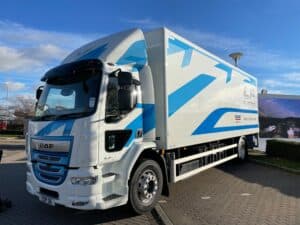COP26 “Drive to Zero” commitment promising for agriculture

NOVEMBER 12, 2021
Glasgow, Scotland — The National Farmers Union (NFU) applauds the Canadian government’s commitment to 30% of new sales for zero-emission medium- and heavy-duty truck and bus fleets by 2030 and 100% zero-emission new sales by 2040. The government made the commitment on November 9, Transport Day at COP 26. The switch to zero emission cars, trucks, and machinery is inevitable as we move past our target of 40% emissions reduction by 2030 and toward 2050 when emissions will need to be very close to zero.
We now call upon the Government of Canada to build upon this solid target by developing and implementing a comprehensive national strategy for the infrastructure that will be required to support widespread adoption of this technology. The NFU also calls upon the Government to broaden its zero-emission ambition to include the agricultural sector. The technology behind battery-electric (or hydrogen) power for medium- and heavy-duty trucks and buses has advanced significantly, and now has real potential to transform the agricultural equipment industry by making electric (or hydrogen-fuelled) powertrains powerful, plentiful and affordable.
“Canadian government data tells us that CO2 emissions from diesel fuel burnt in farm equipment contribute 11% of total Canadian agricultural emissions. Also, farm machinery such as tractors and combines have decades-long working lifespans, so fossil fuelled farm machinery sold today may still be emitting into the 2050s. These two facts together mean that we perceive an urgency to reduce and eliminate emissions-heavy machinery on an accelerated schedule,” says Glenn Wright, NFU member and grain farmer from Saskatchewan.
“If Canada moves ambitiously on this, we can begin to restore and expand Canadian-made farm equipment manufacturing that could begin with medium-sized and smaller tractors and equipment and move into higher-horsepower machinery as battery technologies further mature,” says Anastsia Fyk, a buckwheat farmer representing Manitoba on the NFU Board of Directors.
The positive implications of such a strategy are numerous. By combining electrification of farm equipment with on-farm renewable electricity production, farmers can become much less dependent on expensive and continual external inputs like fossil fuels. Additionally, electric powertrains can be quieter, have fewer moving parts, and can require less service and maintenance which could contribute to significant and ongoing cost savings for farmers.
As COP 26 comes to a close, the NFU calls on the Government of Canada to transform ambition into action by setting more concrete targets, and implementing the innovation that farmers truly need in the form of farm machinery powered by clean, renewable energy that will reduce or eliminate fossil fuel emissions from the agricultural sector.
